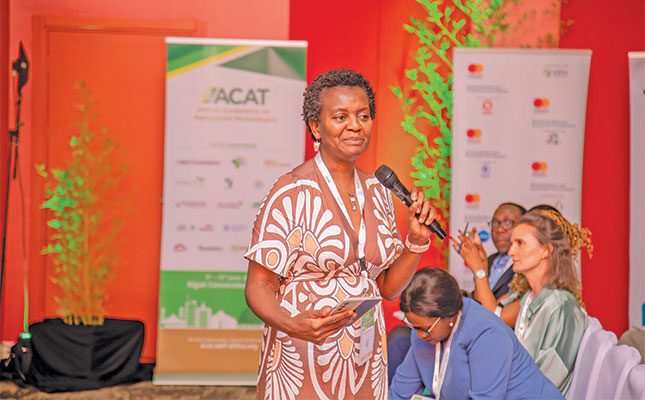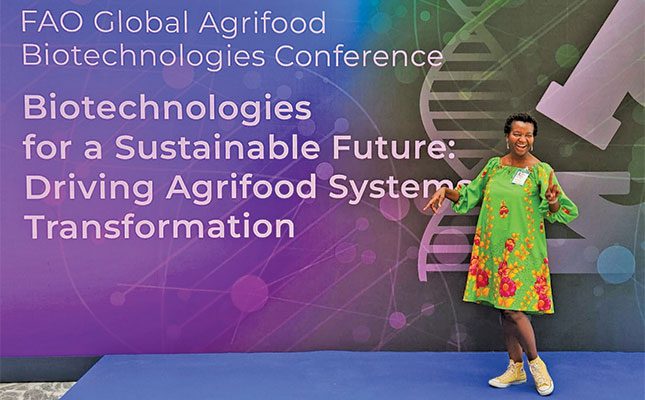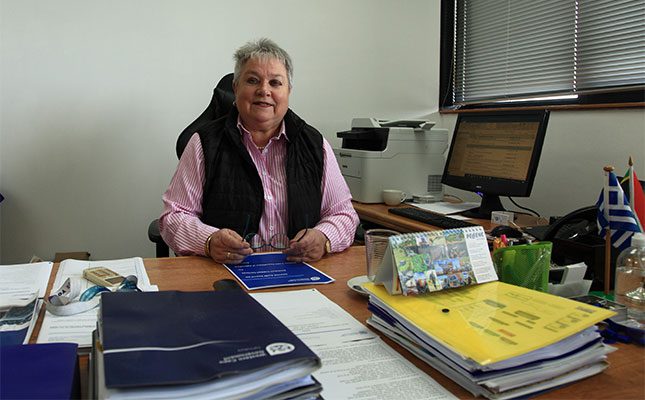
When Dr Hlamalani Ngwenya says, “Agriculture found me,” she is not speaking in metaphor. Her story, rooted in the fields of education, health, and rural development, is one of unexpected turns, quiet resilience, and unwavering belief in the power of people, especially women, to transform food systems from the inside out.
As South Africa celebrates Women’s Month, her journey offers an inspiring example of what it means to lead with integrity, build with intention, and rise with purpose.
From home economics to broader agrifood systems
Raised in a loving, middle-income household as the youngest of six children, Ngwenya always knew she wanted to be a teacher. She was inspired by the community values instilled in her by her parents; a stay-at-home mother and a priest father, whose church work took her to different provinces, and instilled compassion in her.
“My Tsonga name, Hlamalani, means ‘be surprised’, and it really reflects my life journey, that has been filled with many surprises,” she says.
Ngwenya completed her matric at the age of 16 and went on to pursue a four-year Bachelor of Education degree in home economics. Her first job at age 21 was teaching at the very same high school she had attended.
By age 23, she proved her mettle when her class secured a 100% matric pass rate. This was also when Ngwenya received her first regional teaching award.
“At that age, I didn’t know what I was doing, to be honest, but the learners passed, and I realised I had something to give,” she says.
Her transition into agriculture came unexpectedly while teaching community development at a college of agriculture. When a post opened in agricultural extension, the principal asked her to take it on.
“I had studied extension from a nutrition perspective, so it wasn’t a completely new world. But that’s when I began connecting the dots between food, health, development, and farming. I always say I came into agriculture through the back door. Or maybe it pulled me in,” she says.
Redefining the role of a teacher
The year 2001 marked a turning point. Ngwenya joined a systems-thinking training programme that challenged her to move beyond the traditional role of a teacher. It introduced her to facilitation as a tool for enabling change.
“That programme changed everything. I stopped seeing myself as the one with all the answers and started seeing myself as someone who could facilitate learning, transformation, and innovation,” she says.
This mindset shift proved to be catalytic. Her facilitation skills opened international doors, and she began consulting on rural development, agricultural extension and other topics in
agrifood systems across Africa and beyond. To date, she has done assignments in 59 countries, including 25 on the African continent.
“You cannot engage with communities in 59 different countries and stay the same. The work shaped how I see food security, poverty, and the human spirit.
“It gave me perspective and made me more determined to build solutions that work at the local level,” she says.
Balancing career and motherhood
Ngwenya’s career achievements are all the more remarkable given the deeply personal challenges she has navigated. Chief among them was the decision to pause her doctoral studies to raise her children.
“I started my [doctorate] abroad as part of a cohort at the same time when I wanted to start a family. I was pregnant while attending classes. We also had a male colleague in the group who had a wife that was pregnant back home. While sitting in class, I battled morning sickness, and still tried to keep up, while my male counterpart was not affected at all,” she adds.
The physical and emotional demands eventually forced her to put her doctoral ambitions on hold.
“At some point, I had to stop everything. I became a stay-at-home mom. I had three children, and during that time I couldn’t even think about my studies. I had done about 80% of the work, but I packed the thesis away, physically and emotionally,” she recalls.
The pause stretched into a decade. Following the breakdown of her marriage, she found herself at another crossroads.
“After the separation, I had to rebuild. I told myself, you started this thing, you can finish it. It literally took me 17 years from the day I first registered for my doctorate to the day I finally graduated,” she says.
Restoring purpose and rising again
Ngwenya views her long journey toward earning her doctorate not as a delay, but as a testament to resilience.
“I tell women that delay is not denial. Life just took me on a different route. But that route didn’t make me any less capable. In fact, it made me more intentional,” she mentions.
Ngwenya always wore a dual identity as an academic and a practitioner, and held senior positions in government, international NGOs and the private sector.
Today, she is an associate professor at the University of the Free State, where she is head of a research chair for the Communication for Innovation in agrifood systems. Her academic and professional paths now converge in a way that feels purposeful.
“This role brings everything together. My background in education, facilitation, nutrition, and extension continues to guide me in this work,” she says.
Leadership anchored in integrity
Ngwenya has made her mark in governance on boards and in advisory roles both locally and internationally. Between 2016 and 2021, she was appointed by then Minister of Agriculture, Forestry and Fisheries Senzeni Zokwana to serve on the board of the Citrus Industry Trust, and later became the board chairperson.
“It was a very important space. As board chair, I focused on driving transformation and making sure funds were managed with integrity,” she said.
She also served as board chairperson for the Regional Agricultural and Environmental Innovations Network for Africa, an international NGO, and currently advises several global institutions on agricultural development.
“No matter where I serve, I keep the same principle: stay true to yourself.
“I very strongly believe that integrity is the way to go,” says Ngwenya.
A global face for extension innovation
Ngwenya’s most celebrated contribution to global agricultural development is her work with the Global Forum for Rural Advisory Services. Since 2015, she has served as its professionalisation coordinator, spearheading efforts to modernise agricultural extension.
“We realised that universities are slow to update curricula, but agriculture is changing fast – climate change, gender issues, artificial intelligence, and digital tools. So we developed the New Extensionist learning kit to fill that gap,” she says.
The kit includes practical modules that address the emergent issues in agricultural extension and advisory services, including communication, gender, nutrition sensitivity, value chains, entrepreneurship, and digitalisation. It is now used across Latin America, India, and Africa, including at the University of the Free State.
“The idea of the New Extenstionist was not mine at all, but I was hired specially to drive the design and implementation of it and I became the face of it globally. I am humbled by this opportunities, the response and the uptake of it,” she says.

Paying it forward
Ngwenya’s story is filled with moments where others saw potential in her. Now, she is committed to creating those same opportunities for others.
“I am where I am today because there were so many women and men who saw potential in me and went out of their way to open doors for me, carried me and supported me to grow in person and as a professional. So, I know what it feels like to be seen,” she says.
Through teaching, mentorship, and leadership, she continues to uplift young professionals, especially women from rural areas.
“You don’t rise alone. When you walk through a door, you hold it open for the next person. That’s my philosophy,” she says.
From empowerment to emancipation
For Ngwenya, empowering women in agriculture is about more than representation. It is about transformation.
“Empowerment is when someone gives you power. It is an external drive. Emancipation emanates from within and it is that inner ability that enables you to own that power, use it, and shape it for your context. Understanding this difference is crucial for personal growth,” she says.
She says that women are already leading food production across the continent. The next step is to ensure they lead at every level of decision-making.
“Women are not waiting. We are already in the system. But we need to be recognised and supported. And we need to show up boldly, ready to lead,” she says.
Rethinking food security
When asked about the most urgent challenges facing the country, Ngwenya is quick to differentiate between food availability and access.
“Statistics shows that South Africa is food secure at a national level, but food insecure at household level. That tells you that the issue is not production, but access,” she says.
She argues for a more localised, inclusive food system that meets people where they are.
“South Africa is like three worlds in one. We need systems that respond to all three realities, not just the privileged one,” she says.
She says that local innovation is key. “Traditional leaders and local governments have land, people, and influence. If they build bottom-up food systems, we will see transformation,” she says.
An ongoing mission
Ngwenya’s journey is not one of linear progress. It is a story of detours, delays, and determined returns. As she continues to teach, lead, and influence agricultural development across the continent, she carries with her the lessons of her past.
“Purpose doesn’t leave you. Even when you stop, it stays with you. And when the time is right, it pulls you back,” she concludes.
Ngwenya has received numerous accolades including the prestigious Order of the Baobab in Bronze 2021 for her contribution to sustainable agriculture, education, and community empowerment.
Get trusted farming news from Farmers Weekly in Google Top Stories.
➕ Add Farmers Weekly to Google ✔ Takes 10 seconds · ✔ Remove anytime






